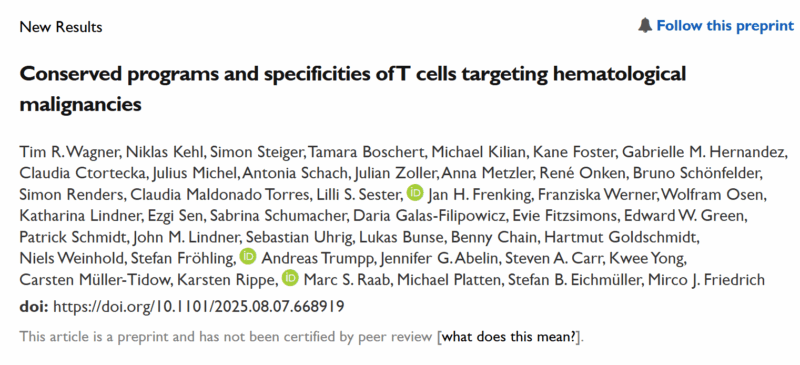
Mirco Julian Friedrich: Conserved Programs and Specificities of T Cells Targeting Hematological Malignancies
Mirco Julian Friedrich, Principal Investigator at DKFZ German Cancer Research Center, shared a post on LinkedIn about a paper he co-authored with colleagues, published in bioRxiv:
“First preprint from the Friedrich Lab is out!
In a sea of T cells, how do you identify the rare ones that can actually recognize myeloma or AML?
An amazing team effort led by Tim Wagner, Niklas K., Simon Steiger (Rippe Lab at DKFZ), and Tamara Boschert (Platten Lab at DKFZ) and supported by wonderful collaborators across Heidelberg, London, Boston, and beyond.
‘Conserved programs and specificities of T cells targeting hematological malignancies’
In hematological cancers like multiple myeloma and AML, we have long known that T cells infiltrate the bone marrow – but which ones are truly tumor-reactive, and how to reliably identify them, has remained a major challenge.
Unlike in solid tumors, there are almost no descriptions of anti-tumor T cells in leukemia or myeloma. Most are bystanders; bona fide tumor-specific TCRs are rare, and their transcriptional identity has been elusive.
In this study, we tackled this problem head-on with an integrative, bioengineering-driven approach:
- We established and performed microfluidics-based single-cell assays of thousands of bone marrow T cells, screening them directly against primary tumor cells from the same patients
- We combined this with deep immunopeptidomics and single-cell multi-omics to map >300,000 bone marrow lymphocytes and >17,000 HLA-presented peptides.
- We reconstructed and functionally validated tumor-specific TCRs.
Our key findings:
- Tumor-reactive T cells exist in patients with AML and myeloma, and they share a conserved transcriptional state distinct from bystanders and virus-specific clones.
- These cells recognize a partially shared antigen landscape, including noncanonical peptides from nuORFs and pseudogenes
- We engineered a TCR-intrinsic fitness model (TFiT) – a transcription-based classifier that can predict tumor specificity and stratify patient response in MM and AML immunotherapy.
This is our blueprint for decoding rare, endogenous anti-tumor immunity in blood cancers – and for engineering personalized TCR therapies, biomarkers, and vaccines in patients where T cell immunity is latent but underutilized.
This work was supported by Deutsche José Carreras Leukämie-Stiftung e.V., Else Kröner-Fresenius-Stiftung, and Schwiete Stiftung, and our amazing institutions DKFZ German Cancer Research Center, HI-STEM gGmbH: The Heidelberg Institute for Stem Cell Technology and Experimental Medicine, University Hospital Heidelberg (UKHD), and Broad Institute of MIT and Harvard.”
Title: Conserved programs and specificities of T cells targeting hematological malignancies
Authors: Tim R. Wagner, Niklas Kehl, Simon Steiger, Tamara Boschert, Michael Kilian, Kane Foster, Gabrielle M. Hernandez, Claudia Ctortecka, Julius Michel, Antonia Schach, Julian Zoller, Anna Metzler, René Onken, Bruno Schönfelder, Simon Renders, Claudia Maldonado Torres, Lilli S. Sester, Jan H. Frenking, Franziska Werner, Wolfram Osen, Katharina Lindner, Ezgi Sen, Sabrina Schumacher, Daria Galas-Filipowicz, Evie Fitzsimons, Edward W. Green, Patrick Schmidt, John M. Lindner, Sebastian Uhrig, Lukas Bunse, Benny Chain, Hartmut Goldschmidt, Niels Weinhold, Stefan Fröhling, Andreas Trumpp, Jennifer G. Abelin, Steven A. Carr, Kwee Yong, Carsten Müller-Tidow, Karsten Rippe, Marc S. Raab, Michael Platten, Stefan B. Eichmüller, Mirco J. Friedrich
You can read the Full Article on bioRxiv.

More posts featuring Mirco Julian Friedrich.
-
Challenging the Status Quo in Colorectal Cancer 2024
December 6-8, 2024
-
ESMO 2024 Congress
September 13-17, 2024
-
ASCO Annual Meeting
May 30 - June 4, 2024
-
Yvonne Award 2024
May 31, 2024
-
OncoThon 2024, Online
Feb. 15, 2024
-
Global Summit on War & Cancer 2023, Online
Dec. 14-16, 2023
